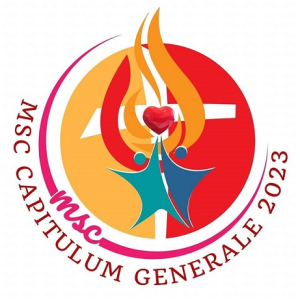Peter MALONE
Girl in the Book, The
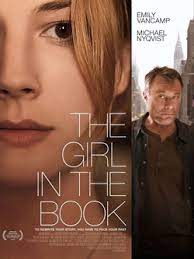
THE GIRL IN THE BOOK
US, 2015, 86 minutes, Colour.
Emily Van Camp, Anya Mulvoy Ten, Michael Nyqvist, David Call, Michael Christofer, Talia Balsam.
Directed by Mary Cohn.
A brief drama set in the world of writers and publishing. It is also a story of a sexual predator – filmed before the emergence of the Me Too# response to Harvey Weinstein.
The central character, Alice, is played in the present by Emily Van Camp and 17 years earlier by Anya Mulvoy Ten. We are introduced to her in the present, disturbed, working for the publishing firm, her father and influential publisher and strong influence on her life. Her boss is asking her to prepare an e-book of one of the company’s bestsellers. She then meets the author, played by Swedish actor, Michael Nyqvist.
In the past, she has trained to be a writer and is introduced to Nyqvist who guides her with her writing, becomes infatuated with her, sexual approach which confuses and alarms her – manifest in a scene where the author does a reading from his book, drawing on his experiences with her and she leaves the room. He rationalises his writing in drawing on her experience and the important effect that it would have on her life.
In the present, Alice is confused, sexually awry, some affairs, falling in love but betraying him as well as her closest friend. Again, the influence of her father.
The audience has to pay attention, especially at the beginning in realising that we are seeing two stages in Alice’s life, the issue of her sexuality, the influence of the predator, his presence in the world of publishing.
- the world of literature, writing, book production, bookselling? Authors? Relationships?
- The New York setting, the two periods, 16 years apart?
- New York, the book company, offices, homes, book readings, social functions…? The musical score?
- Alice and her story, audiences initially alert to the two different times? The moving between each period, throwing light on Alice young, Alice older?
- The author, his book, Alice being asked to transfer it as an e-book? Her reactions, interactions with her boss? The influence of her father? The author appearing? Her memories?
- Alice in the past, young, her father and his literature connections, the introduction to the author, her own writing, interactions with the author, his help, manner, seduction, creditor? The effect on her? His book, the book reading, her leaving? Her feelings of being exploited?
- Alice in the present, her work, her own writing, wanting to promote the young author? Clashes with her boss, with her father? Interactions with the author? Her best friend, her son, their talking together, support? Her visit, the babysitter, the sexual encounter, her friend’s reaction, cutting her off? The encounter with effort, his cause, friends, meetings, the attraction? Alice and her further sexual encounter, motivations? Everton his reaction, her wanting forgiveness, her video with the 16 reasons for forgiveness?
- Work at the office, the socials, the promotion of the book, the confrontation with the author, his memories of the past, excusing himself?
- Going to have it, asking forgiveness? The possibilities of some healing and future?
Pariente/ Guilty Men
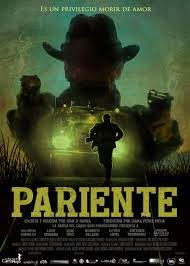
PARIENTE/ GUILTY MEN (Kinsmen)
Colombia, 2016, 115 minutes, Colour.
Rene Diaz Calderon, Willington Gordillo, Leidy Herrera.
Directed by Ivan Gaona.
A film from Colombia, set in 2005. It is very much a film for Colombia itself – but had success in award nominations and in festivals.
The film presupposes knowledge of situations in Colombia in the latter part of the 20th century – although the focus is not specifically on the drug dealers and cartels but rather on paramilitary organisations and the relationship with the government. Audiences have to pay attention to the characters and the situations.
The film has an authentic feel, the locations where it was made, and the fact that the director used local people to act in his film. They are very convincing in dramatising roles that they experienced in actual life.
The opening is striking, a dark night, men waiting on the road for a meeting, an exchange, an old man shooting man involved in the exchange, money not handed over, the waiting men going back to their ordinary lives.
The old man who did the shooting has memories of the paramilitary. He also clashes with his prospective son-in-law who wants the money to finance his immediate wedding because his fiancee is pregnant. Another member of the group, the central focus of the film, is in love with the pregnant woman, serenades her, offers her cassettes from a cache of musical cassettes. He also observes the other two men, especially his rival, seeing his rival attack the father-in-law. Then there is another man, raising pigs, a drastic story of his father suspecting a man of stealing, shooting him (and taking his cache of assets), interacting with the others, but suspicious.
The key scenes are a gathering of the family to celebrate the announcement of the engagement, joy, revelry, but also rivalry.
There is also a scene with the testing out of a rifle, and the central character seeing his rival and the old man clashing and going to rescue the old man.
The other is a scene where the two rivals, at night, are pursued by a mysterious man on a cycle – indicating the paramilitary. And, it leads to a climax, the confrontation between the two men and the fiancee.
Certainly a film for those interested in cinema coming from Latin America.
Happy Now
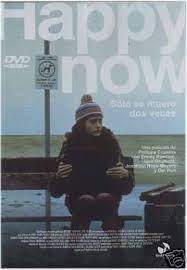
HAPPY NOW
UK, 2001, 97 minutes, Colour.
Ioan Gruffud, Paddy Considine, Emmy Rossum, Robert Pugh, John Henshaw, Richard Coyle, Jonathan Rhys Meyers, Susan Lynch, Om Puri, Alison Steadman.
Directed by Philippa Cousins.
Happy Now is a rather ironic title for this Welsh story. It begins with a beauty pageant in the local town, the winner, her relationship with her father, his pride, giving her the gift of a car, its breaking down, help from a local tramp, two young men – and her death and disappearance.
While the drama focuses on various aspects of the town, the aftermath, 14 years later, has one of the young women who has left the town for Alaska returning with her daughter who more than resembles the dead beauty queen. Audiences will guess who is the father. And she is played by Emmy Rossum in both roles.
The film also shows the young men responsible for the young woman’s death, Richard Coyle as the nervous real estate agent (who even has recourse to a self-promoting would be psychic, Jonathan Rhys Meyers in an early role) but, more tellingly, the aggressive man in the past now running a bank, married, standing for office – strong performance by Paddy Considine.
Into the town comes a policeman who has baulked in his previous career, Ioan Gruffud, who takes an interest in the past case – with a number of strong British actors in supporting roles led by Robert Pugh as the father, Om Puri as the tramp, Susan Lynch as the woman, John Henshaw as the old policeman, and a cameo by Alison Steadman.
It builds up to a violent climax.
- The title, ironic? Happiness for which characters?
- The Welsh setting, the town, homes, streets, pubs, the countryside? The musical score?
- The opening and the tone, the beauty contest, Jenny, proud father, the gift of the car, driving, the breakdown, the encounter with Tin Man, his going to get help, kindness, the phone call to her father, his being knocked down by Glen and Joe, their encountering Jenny, Joe and his timidity, Glen and his advances, teasing Jenny, her fall, the injury, the disappearance?
- The court case, Tin Man and the evidence, the judgements, Glen in the court, the father in the court?
- Years later, Joe as a real estate agent, but still timid? Haunted by the memories? The secrecy? The contrast with Glen, marriage, family, bank, standing for election, campaigning, smug and arrogant?
- Max, the police, his past and his story about freezing, the transfer to the town, at the boarding house, the encounter with Tina and Nicky, the interactions with Pete and the memories of the past? The issue of Jenny’s disappearance? His response to Joe and Glen?
- Tina, returning to town, years in Alaska, her daughter, the resemblance to Jenny, the effect on everyone? Nicky and her being puzzled? The resemblance to Jenny and the audience realising who her father was?
- Mark Wraith, place in the town, his room, superstitions, violence, Joe consulting him, wanting Nicky destroyed, Mark taking her, Max confronting, Glen and the attack, killing Mark?
- Tin Man, getting out of jail, the kindly woman giving him a job, her place being trashed? Losing his job, Max taking up his cause, the explanation to the father, getting the job, Glen getting his hair cut, walking out?
- Tina, the attack, in hospital? Max and his concern?
- Joe, his life, dependence on Glen, the abduction of Nicky, Max, the pursuit, the father and Tin Man, the return to the original scene? Tin man, abducted, getting out of the car boot? The phone call? Desperation?
- At the scene, the decision to kill Nicky and bury her? Yet wanting to dig up the body of Jenny, the hand in the air, suggestion of buried alive? The talk, Nicky’s fear, Joe with the rifle, shooting Glen? Nick his escape?
- The combination, Joe and his confession, the father bonding with his daughter, Tin Man vindicated?
Dock Brief, The/ Trial and Error
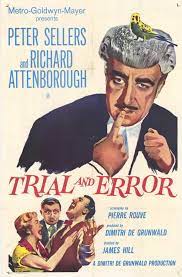
THE DOCK BRIEF/TRIAL AND ERROR
UK, 1962, 76 minutes, Black and white.
Peter sellers, Richard Attenborough, Beryl Reid, Frank petting goal, Frank Thornton.
Directed by James Harris.
The Dock Brief is distinguished because it is based on a play by John Mortimer, celebrated for his creation of Rumpole of the Bailey.
This is the kind of small budget film made in the late 1950s and early 1960s in Britain, short running time, black-and-white photography, a blend of the comic and serious, and featuring a distinguished casts. This time it is very much Peter Sellers playing off Richard Attenborough (and they both had appeared a short time earlier in Only Two Can Play).
Basically, this is conversation between a rather inept barrister, played by Sellers, fairly straightforwardly in comparison with other impersonations. Richard Attenborough plays a harassed husband who has murdered his wife, played with hysterical overtones by Beryl Reid. Most of the film is conversation between the two, the play has been opened out by a series of flashbacks, illustrating the husband’s life, the wedding, his encounters with the wife, a continual laughter and giggle, taking in a lodger, hoping for an affair between them, and his killing his wife.
The court case does not go very well, Sellers not able to defend his client, their creation of a scenario, including a fake witness. With the combination with the husband in the dock, practically pleading for a guilty verdict so that it will all be over. However, the case is dismissed – because of the ineptness of the defence!
While audiences know that Peter Sellers is a genius with a range of characters and accents, this film is an interesting performance by Richard Attenborough who by this stage had shown versatility, from the thug in Brighton Rock, to some of the war films, Dunkirk, and was about to star the next year in The Great Escape. (In the late 60s, Richard Attenborough began to direct, Oh, What a Lovely War, significant films and his Oscar-wind for Gandhi). Attenborough continued his acting career for decades, in the 90s appearing in Jurassic Park and Elizabeth.
Fall Time
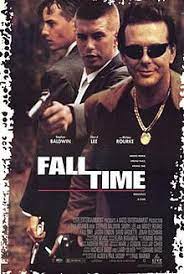
FALL TIME
US, 1995, 88 minutes, Colour.
David Arquette, Jason London, Stephen Baldwin, Jonah Blechman, Sheryl Lee, Mickey Rourke, Steve Alden, Tom Hull, J. Michael Hunter.
Directed by Paul Warner.
This 1990s brief film about three young men, friends from the past (illustrated vividly early in the film with black-and-white photography) who, when they grow up, decide to pull off an ambitious prank, staging a shooting and abduction, robbing the bank.
David Arquette is the leader of the group, Jonah Blechman as his backup, and Jason London is a more independent member of the group, better educated, going to college. The young men have been dominated by their fathers, businessman in the town.
But, this is a comedy and drama of errors, many errors. In the meantime, a former prisoner played by Mickey Rourke has a plan to rob the bank, using a colleague over whom he has some power, Stephen Baldwin.
The young men stop at a shop and the proprietor is suspicious, later phoning the police. The colleague who is to be falsely shot and abducted is dressed, suit, tie and hat, exactly the same as the other associate – who, mistakenly, is abducted.
There are pursuits around the town, phone calls from a man in the diner, the police, the former prisoner shooting the police, taking the unwitting decoy prisoner, the robbery, taking the wrong cashier as hostage.
They are all aiming to arrive at the three young men’s rendezvous, various mishaps along the way, flat tires, the prisoner getting lost, the police in pursuit.
But, what was intended as a fun prank turns out to be quite grim, violence, deaths, and the cashier with an alternate story as to what has happened, getting on a train with the money.
- The title, the ironies with the ambitions? Everything going wrong?
- The Arkansas setting, the South, racist remarks, young people, moving out, futures?
- The prologue, black-and-white photography, the three boys, the celebrations, friendship, the birthday, the cake falling, the severe father?
- Growing up, their plan, going to the bridge, diving into the water, getting dressed for the fake robbery, banter between them?
- Dave, the leader, rebellion against his father, Joe, his father, quieter? Tim, different, going to college? The arguments in the car? Dave and his daring with speeding to the train, Tim and his reaction, getting back in the car?
- The glimpse of Florence and Leon, waiting, the bond between them, planning the robbery, rehearsing the plan?
- The trio, stopping at the gas station, Joe reading the magazine and Tim’s correcting him? The observations of the man at the counter, later ringing the police?
- The going into town, Tim, suit and tie, dark glasses? The irony of Leon, suit and tie, dark glasses? The man in the diner, both men being there, the accident with Leon’s tie? The man at the diner and his contacting the police? Tim hurrying out? The irony of the two men, similar? Leon and his arrival, intimidating Tim, Tim running, hiding in the garbage, Florence finding him, taking him, interrogation, going through with the plan, Tim with the gun, to get Patty, the robbery, opening the vault, Florence arriving pretending to be FBI? The plan going alright, the police arriving, flourishes the policeman?
- The abduction, David and Joe, taking Leon by mistake? Her satisfaction, going to the rendezvous, discovering Leon, the gun, his tying them up, gagging them, hanging Joe with Dave as anchor? The Leon feeling betrayed by Florence, Dave fabricating the story about being in league with Florence, Leon becoming more angry?
- Dave’s father, angry, his wife quietly baking the high, Dave taking the car, going to the police, finding the dead policeman on the street, being taken in, wanting his car back?
- Florence pursuing Tim and trying to find the rendezvous? Tim and his taking Carol, thinking her Patty, the drive, the talk, the tyre, his cutting himself, first aid, Carol and the sexual attack, their walking? The police and Dave’s father driving?
- The buildup to the final confrontation, Leon on the gun, Florence shooting Joe, David and his reaction, his being shot? Tim entering, confronting Leon and Florence, their both being shot? Tim shot, Carol tending to his wounds?
- Children’s ambitions, youthful prank, everything going wrong, grim ending?
- Carol and the money and the visualising of her alternative story of what happened?
Last Film Show
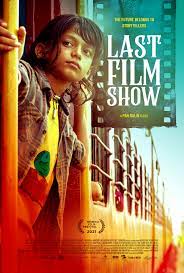
LAST FILM SHOW
India, 2021, 110 minutes, Colour.
Bhavin Rabari, Richa Mee Gregna, Bhavesh Shrimali Dipen Raval,
Directed by Pan Nalin.
India loves movies. And India probably has the largest film industry in the world. And this is a very pleasing story is a kind of love-letter-movie to Indian Cinema and beyond. In fact, several directors are mentioned in the opening credits and, there is an admiring long litany at the end, naming and paying tribute to a very wide range of directors.
The film is set in 2010, in a small town in Gujrat, which does have its own cinema, the Galaxy, with the huge 35mm projector, lots of film stock, and patrons lining up for each film, the Galaxy often having to put up the House Full sign.
But this is a story of a young boy, Samay who discovers a love for cinema, who is delighted with the light, playing with the light, finally wanting to study light and make movies. The film’s writer-director, Pan Nalin, is much older than Somay in 2010 but the story is evocative of his childhood and his art fascination that led to his becoming a director.
The young Bhavin Rabari is one of those child actors who commands our full attention, his eager face, his intense eyes, his delight in the movies, his capacity for friendship, the local boys, and, especially, with Fazal, the Galaxy’s projectionist. As we ourselves gaze at the close-ups of Somay’s delighted face, rapt in the films, we might wonder what we would have looked like had anybody taking photos of ourselves when young, delighted with watching the films. Moviegoers (and, especially, reviewers) can readily share Samay’s wonder.
But, the drama is not plain sailing. Samay’s father takes him to a film (a religious one, hoping he will get over it), is a proud Brahman and does not want his son involved. But, once at the movies, a desire to be always at the movies, Samay sneaking in, ousted by the managers, befriended by the projectionist (and sharing the wonderful lunches his mother prepares – and food fans will appreciate the many lunch preparation sequences). And Samay, whose job it is to sell cups of tea to the passing train passengers, his father having a stall at the station, builds his own mini projector to show cans of films which he purloins to his friends, then getting them to create their own sound effects as they watch.
But, it is 2010 and a dramatic change we might not have anticipated – 35mm film, projectors becoming obsolete, the digital age. The projectionist has no English to read the player instructions and is fired. And the sympathetic local teacher has advised Sunday that to get anywhere he needs to learn English.
There is an important sequence where Samay follows the trucks with the old projectors and cartons of film, discovering a factory where they are recycled, the projector turning into cutlery, the celluloid turning into brightly coloured bangles.
There is great pathos as the film comes to an end, the decision his father (who had been fond of caning his disobedient son), the farewell to his mother and sister, to his friends, but getting the projectionist a new job working at the station, and venturing off to the city and to a career.
Who would not enjoy this pleasing film?
- The director’s love for film, his own experiences, child, art, ambitions, his career?
- The Gujrat setting, the small town, the railway station, the trains and selling cups of tea, the stall, home, cooking, the cinema, the audience, the projection room, the cameras? The visit to the city, the industrial plant for the projectors and celluloid? The musical score?
- Films, the Indian traditions, the excerpts shown during the film?
- Samay’s story, his age, his strict Brahman father, his loving mother, his sister, working at the station, cups of tea, going to school, Mr Dave and the sympathetic teaching, his encouragement for Samay to learn English, going to the movies, the religious movie, his father taking the family, enjoyment? Samay at his fascination, the images, the action, the light, his hand in the light? His returning to the cinema, sneaking in, his being ousted, the encounter with Fazal, his supplying food, Fazal showing him the projection room, letting him watch the films, handling the celluloid, the projector, the lenses? The repercussions, his friends and talking, the ruined building, stealing the cans, the films, editing them, building the projector, showing the films, the delight, the little girls, their all making the sound effects?
- Samay, his supportive mother, the food? His father, strict, the canings, the work at the station, discovering so may going to the films, punishment?
- The managers of the cinema, confronting Fazal,ousting so may come the police coming to the town, the school and rolling, Samay in jail, the other boys, his father getting him out? The plan for painting the outside of the Galaxy, the owners, happy, the children all watching the films?
- The boys, playing together, Samay and his work, the phone call, coming to the cinema, riding the track, the bikes, discovering the transition to digital? Watching the dismantling of the projector, the truckload with all the schools and waste, their pursuing it, Samay going to the warehouse, the dismantling of the projector and recycling it, the celluloid, the making of cutlery, of coloured bangles? His disappointment?
- Fazal, his character, wife and children, enjoying the food, the projection, being fired, not knowing English, unable to do the digital work? Samay and the stationmaster, getting facile the job, Fazal gratitude? His father’s change of heart? Allowing him to go, giving him the money, Samay and his explanation of wanting to study light and to make movies?
- The farewell, the embrace of his mother, the farewell from his father, Fazal, Mr Dave, catching the train – and writing to his future?
- A love letter to cinema, the acknowledgement of the directors, the final sequences and the huge list of international film directors?
Haunting in Venice, A
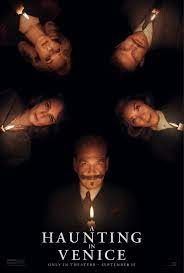
A HAUNTING IN VENICE
UK, 2023, 106 minutes, Colour.
Kenneth Branagh, Tina Fey, Michelle Yeoh, Kelly Reilly, Jamie Dornan, Jude Hill, Kyle Allen, Ricardo Scamarcio, Camille Cottin, Emma Laird, Ali Khan, Rowan Robinson.
Directed by Kenneth Branagh.
Everyone, well, almost everyone, enjoys an Agatha Christie story. And, enjoying a Poirot mystery, happy memories of Albert Finney, Peter Ustinov, played now for the third time by Kenneth Branagh.
Branagh, along with the screenwriter of his other Poirot films, Mike Green, have been wise to choose a rather little-known 1969 book by Agatha Christie, Hallowe’en Party. There are no comparisons with previous versions as they were with Branagh’s Orient Express and Death on the Nile, although there was the television version with David Suchet. However, the team have transferred the plot from England to Venice, 1947, Poirot in retirement, hounded by many Venetians to solve their cases, but he is reluctant.
Christie fans will remember Ariadne Oliver, Poirot’s novelist friend who, here, claims that by writing about him she promoted his career. And, in the often sardonic form of Tina Fey, there is some ironic dialogue. In fact, Ariadne Oliver is in Venice for a new book plot but also to urge Poirot into action again, taunting and challenging him, providing him with the situation, at Halloween, to participate in a seance, to raise the spirit of a young woman who has committed suicide, diving into a canal, daughter of a once famous opera singer.
So, lots of Venetian atmosphere, wonderful vistas of the city, gondolas on the canal, children gathering at an old Palazzo to celebrate Halloween. But, of course, Poirot is not only sceptical but has some speeches about having lost any belief in the soul and, therefore, in God. But, he is in for a few jolts!
Most of the action takes place overnight, the arrival of the medium, Michelle Yeoh, the welcomed by the singer, Kelly Reilly, the doctor suffering from World War II PTSD, Jamie Dornan, his ultra-precocious, Poe-reading son, Jude Hill (both of them so striking in Branagh’s autobiographical film, Belfast). And there are more suspects when there are more murders – the former fiance of the dead girl whom the mother loathes and who seems to be a fortune hunter, the medium’s two assistants, war refugees who kept seeing only half of Meet Me in Saint Louis in the refugee camps, but a desire to migrate to Missouri!, Olga, former nun, carer for the dead girl, and there is also the former policeman, now Poirot’s bodyguard, played by Ricardo Scarmacio.
So, some weird seance sequences – and exposes. Some ghostly appearances. Even an attempt on Poirot’s life. Then, the interrogations, the issue of time and clocks, truth and lies. Of course, there are several twists with the murderer unmasked. But, just when we assume that everything had been solved, there is quite another twist in the final minutes!
Not the greatest – but an easy Christie-Poirot mystery entertainment.
- The popularity of Poirot, Agatha Christie’s novels, the film versions, David Suchet and television versions, Kenneth Branagh as Poirot?
- The original story, later Agatha Christie, 1969? Hallowe’en Party? Transferring the plot to Venice from the UK?
- The city of Venice, the variety of vistas, St Mark’s, the canals, the bridges, panoramic views? The focus on the Palazzo, exteriors, interiors, old, decaying, atmosphere?
- Kenneth Branagh as Poirot, 1947, his career, retirement to Venice? The lineup of people for his services? Refusing the more? The visit of Ariadne Oliver, the past, her novels, promoting Poirot? Her wanting to write a new book, her story, the suicide of the girl, her family, the investigation, the seance? Tantalising Poirot and challenging him?
- Hallowe’en in Venice, costumes, masks, the children, the party, games, enjoyment?
- The situation, the Opera singer, her daughter, the daughter’s engagement, at home, her suicide, Olga and her care, grief? The alienated fiance, the break, his wanting to marry money?
- The setting up of the seance, Mrs Reynolds, her personality, claiming authenticity, her two assistants, her arrival, indicating sensing the presence of ghosts? The third floor, her trance, everybody around the table, Poirot observing and sceptical? The procedure, the typewriter, the letters, the trance, the voice? Poirot and the expose, the mechanism for the typewriter, shamed? And Mrs Reynolds later found dead, transfixed?
- Poirot, sceptical, observing, character assessment? The discussions about the supernatural, about logic? Extending to religious discussion, especially about the presence of God? Poirot against God? Ariadne Oliver and her comments?
- The behaviour in the house, the action overnight, midnight, clocks, timing, Poirot and his wariness, the apples in the water, his being pushed under water, saved?
- The range of suspects and the plausibility of their being the murderer of the daughter, the murderer?
- Mrs Reynolds’ assistants, post-war refugees, supporting her, the money, their wanting to get to Missouri, having seen half of Meet Me in Saint Louis…? Their interrogations, separate, together, contradictions?
- The fiance, his background, relationship with the dead girl, the animosity of her mother? In the kitchen, the interrogation?
- Olga, in the family, a former nun, motives for leaving the convent, her care, concern?
- The police officer, employed by Poirot’s bodyguard, his career, the revelation that he investigated the suicide case, the connection with Ariadne Oliver, Poirot confronting her, the revelation of the teaming together to set up the seance, to get material for her new book?
- The doctor, the experience in the war, nervy, treating the daughter, living in Venice, agitation, interrogation, his love for his son, his death?
- The son, his age, reading Poe, sophisticated, observing, statements, fears, care for his father?
- The mother, her Opera career, her daughter, devoting her life to her daughter, grief?
- The final confrontation, Poirot and his explanations, but the effect on his psychological experiences, seeing the young girl, seeing her photo, the torn photo between her and the fiance, the sense of her presence? His scepticism?
- The explanation, the timing, the mother and her possessiveness, cultivating the garden, the drugs, supplying them to her daughter, to keep her daughter to herself against the fiance, the effect on the daughter, Olga and her concern, unwittingly giving the daughter more poison, leading to the death? The doctor and his examination? The policeman and his investigation? The mother, the dead daughter, throwing her into the canal?
- The resolution, Ariadne Oliver disappointed about not having the story for her novel, the unsympathetic fiance, Olga, the money, enabling the two refugees to go to Missouri?
- The final twist, the issue of the phone call to the doctor, from within the house, the mother summoning him, his blackmailing, her hold over him, his killing himself?
- In the final revelation that he was the boy who did the blackmailing of the mother, to get money for his father, an interesting twist at the end of the twists for an Agatha Christie story?
Cobweb/ Korea
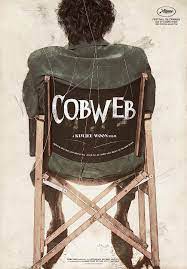
COBWEB
Korea, 2023, 135 minutes, Colour.
Park Jeong-su, Krystal Jung, Oh Jung-se, Lim Soo-jung.
Directed by Jee-woo Kim.
Cobweb is certainly a film for those who have been following the Korean film industry – and, with its 1970s setting, it takes its audience back to the industry of half a century ago, movie styles, movie censorship, showing how things have changed during these decades.
Best to say straight out, this is a comic treatment of its themes. And, very often, it is very broad in its humour (someone remarked that it is slapdash, but the characters and events in Cobweb seem intentionally slapdash). And, it would be fair to say that often the film is quite farcical. The characters, the episodes, the process of making the film, a film within a film…
But, as with topical satire, there are some serious themes underlying the surface comedy.
Audiences, especially with the popularity of the Oscar-winning Parasite, will recognise the star of Cobweb, Park Jeong-su. Here he plays a director who had an initial admired hit but now has a reputation for very ordinary moviemaking. Remembering his celebrity mentor who, literally, went up in flames in his final cinematic achievement, Kim is determined to make a masterpiece. But, his frantic, popping tablets, clashing with the head of the studio, a commanding woman prone to shrill outbursts, getting the support of her niece who might inherit the studio, having weird dreams, getting inspirations to rewrite his script, threatened by the chief censor, cast who offer their own particular difficulties, only two days to complete this masterpiece.
And there is an early scene which has its shot at arrogant film critics who love to savage director-victims. But he is determined to make his masterpiece.
The film he is making is shown in black and white. Colour is for the present.
Which means then that we are moving back and forth, seeing part of the completed film, then the rewrites in production, accidents on set, a recalcitrant pregnant actress, an abusive actor with the director putting on a beard to take his place, the over-wining of the censor, then the arrival of the Minister and trying to make a good impression (and more alcohol), the situation getting ever more awkward.
A decision is made towards the end to film a very complex sequence in one take. We are shown to take but all the manoeuvres needed, shifting the set, stand-in actors, other actors moving out of camera-line… And then the advantage of seeing the scene, the expertise of the one take.
Finally, with the various scenes of the film within the film, we get to understand what it is about, arrogant privileged people, while the the line they have offering to the politicians is that it is definitely anti-Communist!
It seems as though some reviewers would prefer more dignified and polished film – but, it is a satirical farce, some broad comedy, that sends up so many aspects of the film industry.
- Korean filmmaking, the 1970s, the present?
- The film as satire, farce, drama? Comment on film-making, the industry, the personalities, the budgets, censorship, careers?
- The blend of black-and-white photography, the film within the film, the present in colour?
- The focus on the director, his ambitions, his career, his being indebted to his mentor, the conflagration and his death, the director taking the manuscript, his film and its reputation? His subsequent career, considered trashy, the encounter with the film critics and their savaging him, the various comments about film critics and there are attacks throughout the film? His personality, encounters with people, taking the pills, driven?
- The background of the studio, the visuals of the studio, exteriors, interiors and the range of sets? The president of the company, her husband, her control, her tantrums, the issue of censorship and the officials, her absence, working behind her back, her shouting and screaming, apologies, her niece and her role, her change of heart, allowing the production to go ahead, the visit of the Chief, his drinking, observing, her playing up to him?
- The niece, enterprise, her role in the company, taking responsibility, encouraging the director?
- The range of the cast, the lead, his womanising, the young actress, her pregnancy, doubts about paternity? His concern for her, her being sick, tantrums? The older actress and her experience, demands? The veteran playing the mother, her experience? The old man? The hunter, his arguments with the director, drinking, tied up, the director and the beard, taking his place?
- The technicians, the demands made on them, their creativity, the buildup for the single take, the audience seeing it with the movement of the actors, the standings, the dummies, shifts of angles? And then the audience seeing the smoothness of the whole single take?
- The drama in the studio, the director, his dreams, changing his script, wanting a masterpiece, his demands, two days of filming, the various scenes, the response of the cast, the intervention of the censor, his drinking, being tied up and hidden, the tantrums of the cast?
- The plot of the film within the film emerging, the family, betrayals and infidelities, pregnancies, identities, incestuous relationships, consequences? Various scenes, the hunter, the young woman in the trap and her denunciation of men (and the tantrums about her being sleepy, not wanting to do the scene, the niece taking over, the final performance)?
- Critics commenting on the slapdash nature of the film – yet the farcical aspects being slapdash for the purposes of the characterisation and narrative?
- Memories of Korean filmmaking in the past, government control, censorship? The subsequent history? Korean films in the 21st-century?
MSC General Chapter 2023
MSC General Chapter 2023
Opening, September 17th (Australian time, early hours of 18th.

Logo
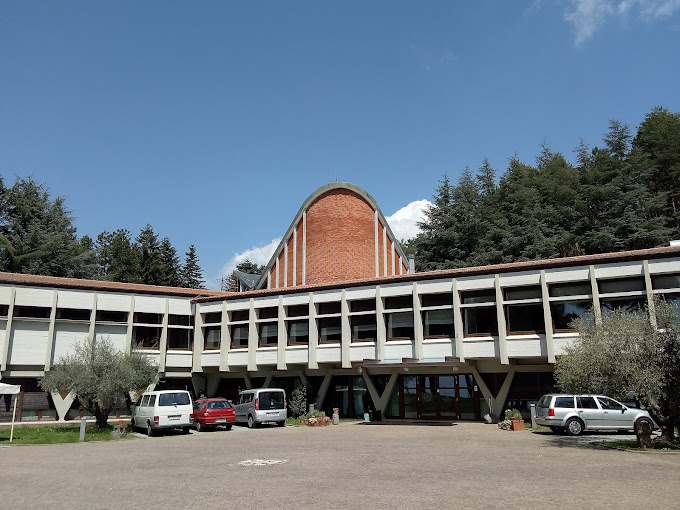
SVD Nemi
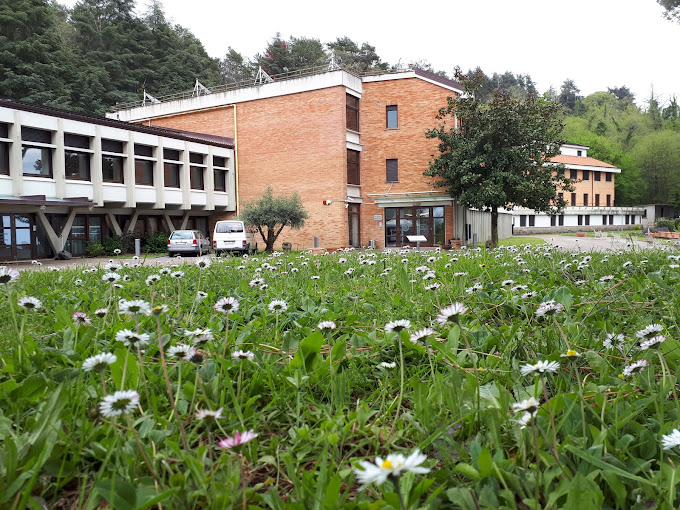
Building

Entry
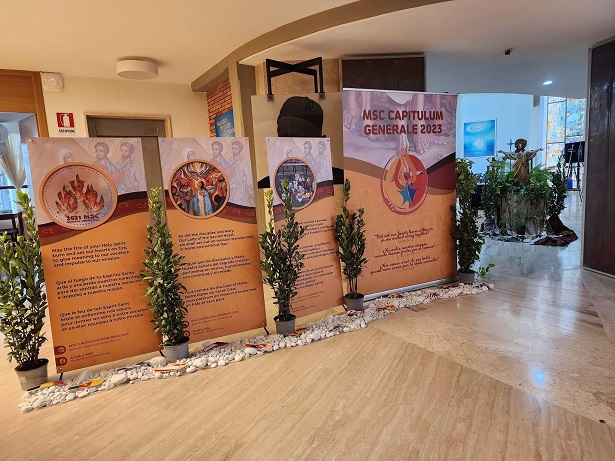
Foyer

Posters
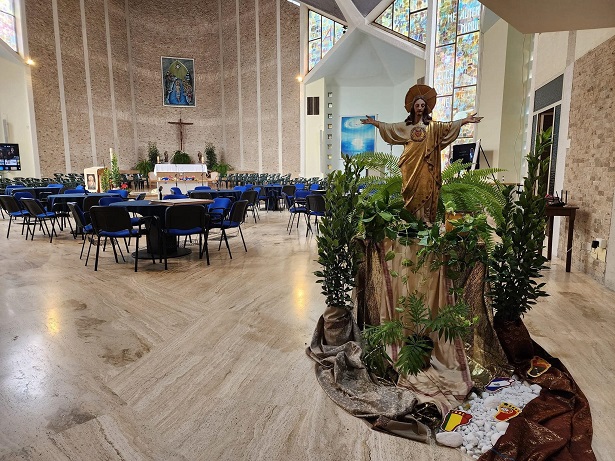
Meeting Room
Space

Albert Yelds MSC, Funeral Mass, Homily
Albert Yelds MSC, Funeral Mass, Homily

Homily, Stephen Dives MSC
I came to know Albert Yelds during our time in the Pacific. In the early 1990s I was posted in Fiji. In 1994 I was appointed superior of the MSC Pacific union and moved to Kiribati where the MSC headquarters were, and there I worked with Albert as he was parish priest of a parish there.
By all measures Albert Yelds was an extraordinary man and an extraordinary Missionary of the Sacred Heart.

Early in his life Albert made known that he wanted to be a priest. His mother told him to write to the editor of Annals of Our Lady of the Sacred Heart magazine. He did this and was eventually accepted to begin his training as a Missionary of the Sacred Heart.
Albert’s health was often frail, even in the novitiate he developed health issues that caused questions about whether he could continue on to priesthood. Typical of Albert, he never allowed setbacks to prevent him doing what he was determined to do.
During his training Albert came to know and appreciate Father Jules Chevalier, the founder of the Missionaries of the Sacred Heart.
He became aware of some of the teachings of Father Chevalier which captivated his heart and became an important part of his own spirituality and mission. For example Father Chevalier said “if only people knew in their hearts how much God loves them unconditionally then their lives could change.” He also adopted the motto that Father Chevalier gave to his congregation: May the Sacred Heart of Jesus be everywhere loved, forever.

Two key elements of his life and ministry were Devotion to the Sacred Heart of Jesus, the embodiment and presence of God’s love for us, and devotion to Our Lady of the Sacred Heart who is the one closest to the Heart of Jesus, pointing us to Him and telling us as she did at Cana: listen to Him and do whatever he tells you.
In his earlier ministry Albert served in several of our Colleges in Australia. At the beginning of every break or holidays as soon as the final duty was over he was in his car and going off all over Australia visiting families consecrated to the Sacred Heart. Marie, his sister, told us that he had over 3,000 on the books then and still over 1,000 when he came back to Australia from the missions. Marie herself was a great support to Albert in this ministry and when he was in the missions in India and Kiribati.

In his missionary work Albert was tireless. He had a great love for the Eucharist and wanted to make sure that as many as possible had the opportunity to receive the Sacrament. It would not be unusual for Albert to do 12 or more Masses on Sundays. Going from village to village, sometimes by car or motorbike or bicycle or walking or across the lagoon by canoe. He baptised more than 500 new Christians every year and countless weddings and funerals. His pastoral zeal was unending. People could come to his house at all times of the day or night for some wise counsel, or if someone was sick or dying, he would be off in a flash no matter how tired or preoccupied he was. Kiribati can be very hot; it is right in the Equator. One hot night Albert woke up and got up to put the fan on. When he stood up he collapsed on the floor. He must have been unconscious because he woke up and thought “I had better get back to the bed, people will find it funny to find me sleeping on the floor. And so he dragged himself back to bed. Then shortly after it was 7am and Albert was in the Church for the 7am Mass.
Albert was a humble, kind and generous man. He loved his people and they loved him.
In the first reading the beloved disciple John writes: “see what love the Father has given us, that we should be called children of God…..we must love others not just in word and speech but in truth and action.” Albert in a real sense lived that in his life and ministry.

In a true sense Albert wore himself out. He suffered in these past months, but always had a smile and kind word of gratitude to all who visited him.
He received all the sacramental help of the church in his last days and was well prepared for the journey he is now making.
In the Gospel we meet Lazarus, whom Jesus loved so much and wept for.
When they took Jesus to where Lazarus was buried his words were: Unbind him, let him go free.
Jesus loved his friend Albert and when he saw him ‘bound up by age and infirmity he said also: Unbind him, let him go free, let him come to me.

Well done Albert. It is time now for you to rest from your labours and enjoy the living presence of Jesus whom you served so generously and faithfully. God bless you and let his light shine upon you. Rest in peace our brother and friend.
Appreciation to Steve Dives for his text and to John Walker for the photos (and his new wide angle lens for photos of the whole sanctuary)
